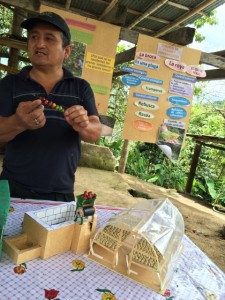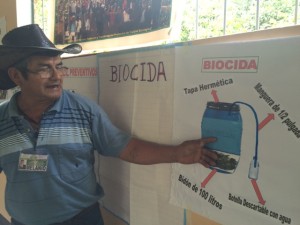With extreme market volatility making life increasingly complicated for coffee farmers, Sustainable Harvest® has been striving to empower these growers so that they may overcome challenges they face. One example is risk management training, which we have provided annually since 2011 to help farmers understand and succeed in the market, and which we’ll continue to implement in 2015.
 Another example is Escuelas de Campo, a three-year project we are working on with our partners Peru Opportunity Fund, Franke Coffee Systems, and Cafe Moto. Escuelas de Campo trains smallholder farmers in Peru’s San Ignacio region about good agricultural practices. With our second year of trainings complete, we have now trained more than 200 farmers in the region.
Another example is Escuelas de Campo, a three-year project we are working on with our partners Peru Opportunity Fund, Franke Coffee Systems, and Cafe Moto. Escuelas de Campo trains smallholder farmers in Peru’s San Ignacio region about good agricultural practices. With our second year of trainings complete, we have now trained more than 200 farmers in the region.
Through these trainings, we have met a very enthusiastic group of farmers who are eager for knowledge and a better life. When we started the program, several of the farmers didn’t understand the importance of taking care of their fields by investing in them. Many were demanding much from their soil but not taking part in renovation and preventive practices, which led to problems such as coffee leaf rust, low yields, and poor quality.
 After two years of regular hands-on training, these farmers are now more prepared to mitigate the consequences of climate change and better understand the demands of the specialty market. We have seen improvements in yields and quality, and these farmers are committed to transferring the knowledge they have acquired to their fellow cooperative members. For example, Escuelas de Campo has supported a group of farmers in transforming their fields into demonstration plots, where they can show other farmers the impact of good agricultural practices on yields. This process is crucial to helping farmers adopt best practices, as it reveals to other farmers that positive results are attainable.
After two years of regular hands-on training, these farmers are now more prepared to mitigate the consequences of climate change and better understand the demands of the specialty market. We have seen improvements in yields and quality, and these farmers are committed to transferring the knowledge they have acquired to their fellow cooperative members. For example, Escuelas de Campo has supported a group of farmers in transforming their fields into demonstration plots, where they can show other farmers the impact of good agricultural practices on yields. This process is crucial to helping farmers adopt best practices, as it reveals to other farmers that positive results are attainable.
We look forward to the upcoming third and final year of Escuelas de Campo, where we’ll make further strides in educating even more farmers in San Ignacio about quality and best agricultural practices.



.png)
